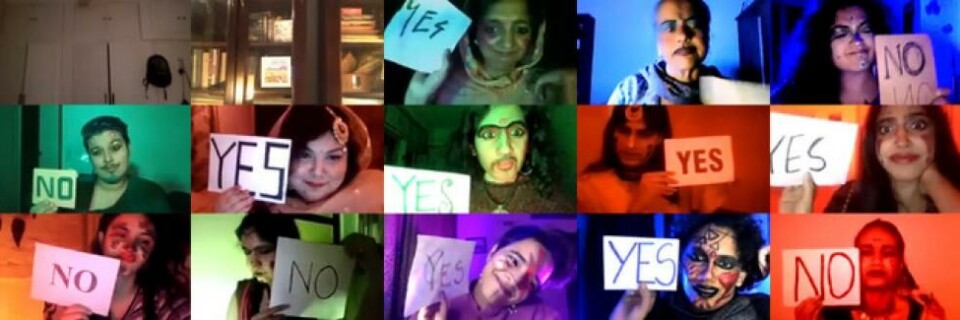
Celebrating struggle on Zoom
One of the performances presented during Oslo Internasjonale Teaterfestival, «Allegedly» is a Zoom-play by the New Delhi-artist Mallika Taneja in which we are invited to reflect on sexual consent and our own judgements.
‘Like the virus, we mutate’ is one of the driving ideas behind the program of this year’s Oslo Internasjonale Teaterfestival (OITF). Inevitably the
festival was challenged by the latest restrictions. Being in a continuous mode of adaptation, all performances will take place online, at home and in other risk-free spaces. Departing from the question ‘At the present time, what do we need most?’, the festival brings together several artists whose thinking intersects topics of care, historical silencing and political embodiments.
From live performance and video installation to Zoom
One of these performances presented this weekend was the play Allegedly by Mallika Taneja. Taneja has been described as a ‘well-known member of New Delhi’s arts scene’, and is known for her activist and satiric performances addressing feminist concerns on the international feminist agenda, most importantly violence against women. Like the festival itself, Allegedly has undergone its own series of mutations. What was originally meant to be a live performance transformed into a video installation, and when this format also had to be cancelled, ended up where much of our lives are located these days: on Zoom.
It is not the first time that Taneja explores unusual performance spaces. In the past she has been part of the not-for-profit Lost & Found, an art initiative transforming parks, community centres, streets and homes into performance spaces, in an attempt to reach new and local audiences. More recently, she started the collective action Women Walk at Midnight, claiming back public space for women in the face of the rampant street harassment in Indian cities.
Theatre in my office
Questions of safety are also at the centre of Allegedly. After logging in sixteen women actors appear on my screen, each filmed live from their colorfully lit living spaces in New Delhi and other cities in India. In their little muted squares, they are getting ready for the performance: clothes are being put on, arms are being stretched, bodies walk back and forth. Then a voice welcomes us, sharing some guidelines for the upcoming 1,5 hour. The liveliness, and the liveness, of the situation gives it a level of excitement. For a moment it almost feels like ‘real’ theatre.
Admittedly, my experience of Allegedly is time-dependent and based on both a sense of abstinence and newness. I haven’t been to a theatre for more than a year and the genre Zoom-play is entirely new to me. Moreover, because I use Zoom a lot for my work, Allegedly’feels almost like theatre in my office.
As this version of Allegedly plays with elements of surprise inherent to the Zoom-medium, I’m hesitant to describe the performance too much. But let’s say the performance is built around a woman describing a dating experience from the past that did not end well. On the receiving end is a friend who is trying to make sense of what happened, by both being a supportive listener but also playing ‘the devil’s advocate’, as she calls it. This conversation is at times interrupted by a chorus of women, who by representing the collective voice, comment on what the two women discuss. Listening to their arguments, opinions and prejudices, we are invited to reflect on our own parameters of (moral) judgement. And yes, we do this through answering polls and questions that appear on the screen for no more than 30 seconds at a time, and with only a ‘yes’ or a ‘no’ to choose from. This participatory element makes me slightly nervous and for some reason I entirely forget that simply not answering is an option too. It’s not the questions themselves that are unsettling, it’s the ad hoc way they’re asked. The critique of online debate culture where democracy and polarisation go hand in hand is obvious and funny. To be careful.
To be careful
The performance, even in its Zoom wrapping, is constructed much like a traditional play. Then again, the delivery is drenched in satire, playfulness and joy, contrasting with loaded subjects such as sexual consent and ‘date rape’. Midway through the performance, I am breastfeeding my one-year old child and the question ‘would you tell your daughter to be careful’ appears on the screen. As I firmly answer ‘no’, I think of my fellow audience members and how differently we may see questions like these.
This brings me to last week and International Women’s day. In a discussion with some feminist friends someone said that maybe it would be better to call it International Women’s Rights Day. Which made someone say it should actually be called International Women’s Struggle Day - even with all the rights of the world we still would have a lot of work to do. So we should just celebrate the struggle. Allegedly reminds me of this. Towards the end, the chorus is singing a version of Happy Birthday with lyrics describing some of the most horrific realities of being a woman. It makes me laugh. I think we might be celebrating. (Publised 15.03.2021)
ReplyForward |
